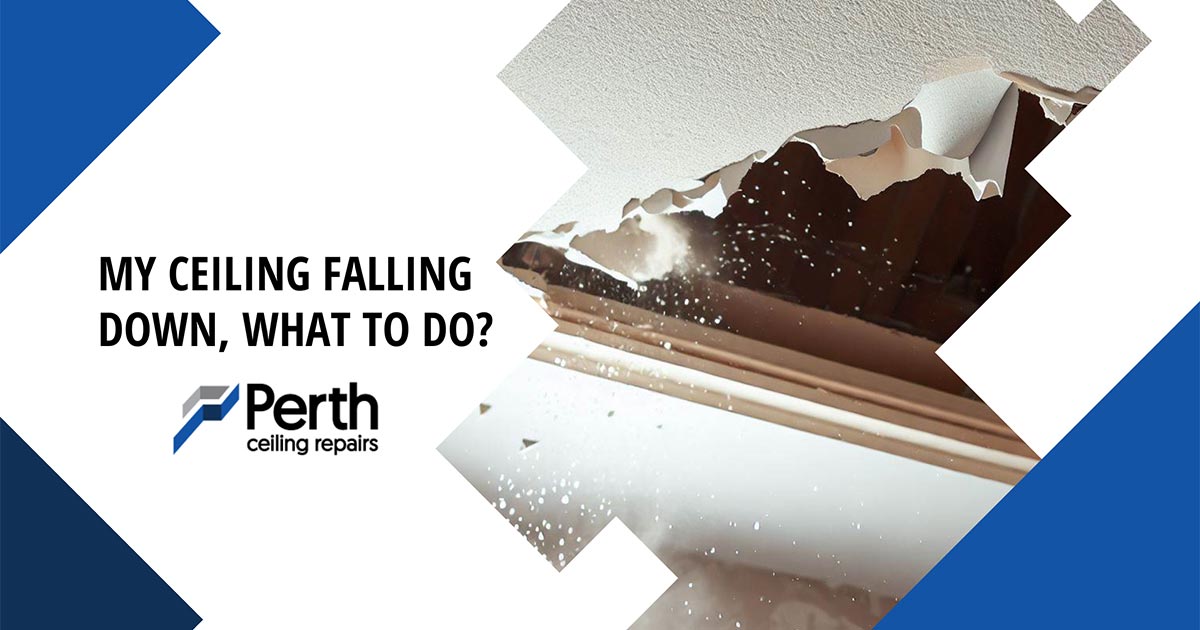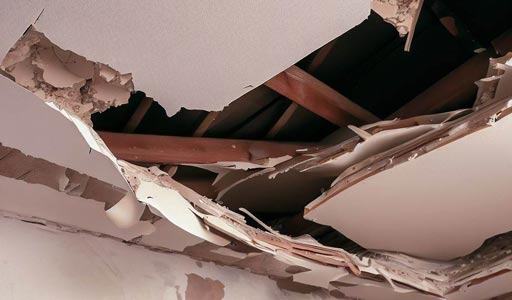
A collapsing or falling down ceiling is not just a structural concern; it can pose severe safety hazards, cause property damage, and lead to costly repairs. Despite being an unnoticed part of our daily lives, the ceiling deserves our attention for both safety and maintenance reasons.
This is a big issue because it can be dangerous and lead to expensive repairs. But, if we learn the signs of a possible collapse, the reasons it happens, and how to stop it, we can keep everyone safe and avoid trouble.
We will talk about everything you need to know when your ceiling is about to fall down. We will tell you about what to do, the warning signs, why it happens, and what you can do to stop it. This information will help you keep your building safe and avoid any problems.
What to Do If Your Ceiling is Falling Down
When faced with a fallen ceiling, it is crucial to take these immediate actions:
- Ensure everyone’s safety. Check for any injuries and call for medical help if needed. Document the damage thoroughly with photos or videos. This can help in insurance claims and any subsequent legal proceedings.
- Inform the property owner, if you’re not the owner, and contact your insurance provider to initiate the claim process. In situations like these, it is also advisable to retain the services of a lawyer to understand your legal rights and possible compensation.
- After taking care of the immediate concerns, it’s important to call in professional ceiling fixers to assess the damage and perform necessary repairs. Remember, a ceiling falling down is a serious matter that requires professional attention.
Don’t hesitate to call Perth Ceiling Repairs. We’re experts in ceiling repair and will work to ensure your home or business is safe and secure again.
Who is Liable When the Ceiling Falls Down?
Liability for a ceiling collapse can lie with different entities depending on the circumstances. Building owners are usually responsible for ensuring the safety of the structure. However, tenants could be held liable if their negligence caused the ceiling to collapse.
Similarly, if the collapse was due to faulty construction or renovation work, the contractors involved may be held responsible. In some cases, if intentional damage was caused by a third party leading to the collapse, they could be held liable.
Navigating the Legal and Insurance Aspects
Dealing with a ceiling collapse involves navigating through insurance claims and possibly, legal actions. Understand your insurance policy, and keep track of all communication with the insurance company. If you’re considering accepting a settlement offer, consult with your lawyer to ensure it covers all your losses.
You’re not obligated to accept initial settlement offers. If it does not adequately cover your losses, you may opt to pursue the matter legally. Legal counsel can help identify losses you may have overlooked and aid in securing a fair settlement.

The Signs of a Ceiling Falling Down
A ceiling doesn’t just fall down out of the blue. It gives off signals that something’s wrong. By paying attention to these signs, you can take action and avoid a big mess or even someone getting hurt.
Here’s what to keep an eye out for:
- A dipping or sagging ceiling. This is one of the easiest signs to spot. If a part of your ceiling is hanging lower than the rest, either in the middle of the room or close to the walls, it’s a warning that your ceiling might be ready to give way.
- Cracks are showing. If you can see cracks in your ceiling, that’s not a good sign. It usually means your ceiling is weak and could collapse.
- Small bumps or bubbles. If you notice tiny bumps or bubbles around the nails or screws that hold your ceiling up, it’s a signal that your ceiling is not in great shape.
Remember, if you spot any of these signs, it’s crucial to act fast. This way, you can fix the problem before your ceiling ends up falling down.
The Causes of a Ceiling Falling Down
If you’re wondering why a ceiling might fall down, there are a few common reasons. Knowing these can help you prevent it from happening in your own home or workplace.
Here are the main culprits:
- Bad installation. Sometimes, a ceiling falls down because it wasn’t put up right in the first place. It could be that the people who installed it didn’t have the right skills or they didn’t follow the correct steps. This can cause the ceiling to be weak and unstable, making it more likely to fall down later.
- Cheap or bad materials. If the materials used to build the ceiling were low quality, it won’t last. It’s like anything else – you get what you pay for. So, if cheap materials were used, the ceiling might not be strong enough to hold up over time.
- Natural disasters. Mother Nature can also cause a ceiling to fall down. This can be because of a fire, a flood, or strong winds. All these events can do serious damage to a ceiling, making it weak and likely to collapse.
If you know these causes, you can keep an eye out for them. This way, you can take action before it’s too late and your ceiling ends up on the floor.
How to Stop Your Ceiling from Falling Down
If you’re worried about your ceiling falling down, there are some things you can do to stop it from happening. Here are some simple steps that can make a big difference:
- Regular check-ups. Keep a close eye on your ceiling. Look for signs that something’s wrong, like sagging or cracks. If you catch these early, you can stop a small problem from turning into a big one.
- Don’t overload. If you’re storing things in a space above the ceiling, make sure it’s not too heavy. Overloading can put too much pressure on the ceiling and cause it to fall down.
- Fast fixes. If you see something that doesn’t look right, don’t wait around. Get in touch with a professional right away. They can fix small issues before they turn into big ones.
By following these steps, you can keep your ceiling strong and safe. Plus, it’s way cheaper to fix a small problem than to deal with a collapsed ceiling.
A falling ceiling can be prevented by remaining vigilant and performing regular maintenance. However, in case of a collapse, knowing the correct response can make a huge difference in ensuring everyone’s safety and appropriate compensation. If you require assistance with ceiling repairs or have any related concerns, don’t hesitate to reach out to us at Perth Ceiling Repairs. We’re here to help.

